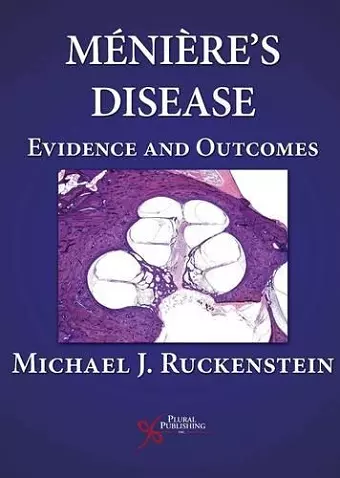Meniere's Disease
Evidence and Outcomes
Format:Hardback
Publisher:Plural Publishing Inc
Published:1st Aug '10
Currently unavailable, and unfortunately no date known when it will be back

Meniere's disease is the most poorly understood and controversial of the inner ear disorders and yet no critical review of the literature currently exists. Previously accepted models of pathophysiology have been discredited, yet no new mechanisms have been established. Evaluation of treatments has been complicated by the high placebo response of the disorder together with the disease's capricious clinical course. As a result of all these issues, the literature pertaining to Meniere's disease is clouded by anecdotal reports, invalid studies, and science of dubious quality. As a result of these factors, practicing otolaryngologists are understandably confused about how they should best evaluate and treat these patients. Michael Ruckenstein's new book clarifies the current state of understanding of the disorder and develops an evidence - based treatment strategy, using a number of challenging case presentations to illuminate the text. As the principal author of this landmark reference, he brings to bear his extensive expertise in the field as researcher and clinician, collaborating with a number of world-renowned contributing authors.
Eric Ross Snyder, MD (Northwestern University Feinberg School of Medicine), Doody's, (June 2010): "**Description** This is a thorough review of Meniere's disease, from historical beginnings to the latest research on diagnosis and treatment. **Purpose** The purpose is to bring some clarification to a topic which is poorly understood and therefore fraught with complexity and contradiction. The information in this book could probably be gleaned from a careful review of the existing literature, but the book presents it in a more accessible format. **Audience** It is targeted at practicing otolaryngologists, although it would probably also be useful to practicing neurologists. **Features** After a background on Meniere's disease that includes the history of the diagnosis, its pathophysiology, and clinical presentation, the book moves on to provide more detailed information on diagnostic testing, including audiology and vestibular testing. It concludes with a thorough discussion of treatment options, including rehabilitation. The book is succinct and well organized... **Assessment** The book is ... engaging and readable..." Anirvan Banerjee FRCS (Consultant ENT Surgeon, Middlesbrough UK), Journal of Laryngology and Otology, (November 2010): "This relatively short 162 page book is a result of the author's interest in Meniere's disease. In his introduction he tells us that he first made a presentation as a Medical Student in McGill's University because he was interested in pursuing a career in otolaryngology. This, along with the fact that his mother had suffered from Meniere's disease, left him intrigued with the disorder. The author obviously has a very long fascination with the disease and this book appears to be a biproduct of this intellectual focus. The book is divided into 3 separate sections and the initial 6 chapters cover the epidemiology, pathophysiology, histopathology, clinical presentation and differential diagnosis of the disease. The chapters are concise and have the same consistency of style, which is pleasing given that it has been written by multiple authors. The next 3 chapters are on diagnostic evaluation. It is fairly comprehensive, covering audiometric testing, vestibular imbalance function testing and includes a section on VEMP, which is very pleasing given my interest in this! The last section covers treatment. In this he covers medical and surgical treatment, and rehabilitation. As with the previous chapters, these are concise but comprehensive. I was particularly impressed on the section of Treatment with Intratympanic Aminoglycoside, which summarises the analysis of all the different methods of administering it. The last couple of chapters are on challenging cases and future directions, written by the author himself. In this he correctly points out that, until the pathophysiology of the disease is better elucidated, it is unlikely that we will develop any specific treatments for the disorder. His hope is that this text will provide a framework and food for thought when researching in the area of Meniere's disease. I think he succeeds in this endeavour unequivocally and this is perhaps one of the best books I have had the pleasure of reviewing." Marja Svrakic, MD, Annals of Otology, Rhinology, & Laryngology, (2011): "...the difficult topic of Meniere's disease is logically broken down into digestible chapters with clear subsections and conclusion headings. It is a well-written review of the current research on the subject, as well as an offering of the author's alternate theories." Mitsuhiro Aoki (Department of Otolaryngology, Gifu University Graduate School of Medicine, Gifu City, Japan), International Journal of Audiology 2011, (2011): "... an evidence-based approach to the disease and includes some significant topics ... Evidence was acquired from a comprehensive list of references. I therefore recommend that intermediate (not beginner) practicing otolaryngologists and neurologists engaged in treatment for Meniere's disease read this book."
ISBN: 9781597563000
Dimensions: 254mm x 178mm x 13mm
Weight: 590g
162 pages